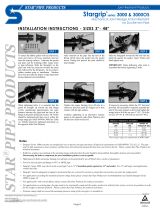Page is loading ...

Series 2006PEC
Restraint and Accessories for C900 O.D. PVC Pipe at
Mechanical Joint Fittings
Installation Instructions
CONTENTS
APPROXIMATE SHIPPING WEIGHT: 17.23 lbs.
For use on water or wastewater pipelines subject
to hydrostatic pressure and tested in accordance
with either AWWA C600 or ASTM D2774
EBAA IRON SALES, Inc.
P.O. Box 857, Eastland, TX 76448
Tel: (254) 629-1731
Fax: (254) 629-8931
Toll: (800) 433-1716
www.ebaa.com
Made in the USA
Series 2006PEC
Restraint and Accessories for C900 O.D. PVC Pipe at
Mechanical Joint Fittings
Qty. Description
1 6 in. 2000PV MEGALUG®
Restraint
1 6 in. EBAA Seal M.J. Gasket
6
Nuts
1 Gasket Lubrication Packet
Restraints Made in The USA
Copyright 2018 © EBAA IRON, Inc. All Rights Reserved
1. Identify the pipe. The 2000PV is for use with PVC and HDPE pipe. The 4 inch through 12 inch size may be
used on C900, and IPS PVC pipe as well as C906 HDPE pipe. Check to see if the spacers under the screws
are in place. If the pipe is C900 or is ductile iron O.D., proceed with spacers in place. If the pipe is IPS O.D.,
remove the spacers. Since 3 inch and 14 inch through 24 inch restraints are only used with one pipe diameter,
no spacers are used. Assemble the push-on joint per the pipe manufacturer’s instructions.
2. Clean the socket and the plain end. Lubrication and additional cleaning should be provided by brushing both
the gasket and plain end with soapy water or an approved pipe lubricate meeting the requirements of ANSI/
AWWA C111/A21.11 just prior to slipping the gasket onto the plain end for joint assembly. Place the gland
on the plain end with the lip extension toward the plain end; follow by the gasket with the narrow edge of
the gasket toward the plain end [The gasket provided may be the EBAA-Seal™ Improved Mechanical Joint
Gasket for C900 PVC Pipe. This gasket is bi-directional having no front or back. For ASTM 2241 PVC Pipe
Sizes (IPS O.D.) a Transition Gasket must be used. The use of a pipe wall stiening insert is required on High
Density Polyethylene pipe.
NOTE: In cold weather it is preferable to warm the gasket to facilitate assembly of the joint.
3. Insert the pipe into the socket and press the gasket rm and evenly into the gasket recess. Keep the joint
straight during assembly.
4. Push the gland toward the socket and center it around the pipe with the gland lip against the gasket. Insert
bolts and hand-tighten nuts. Make deection after joint assembly but before tightening bolts.
5. Tighten the bolts to the normal range of bolt torque [45-60 ft-lbs for 3 inch, 75-90 ft-lbs for 4 inch through 24
inch, 100-120 ft-lbs for 30 inch and 36 inch, and 120-150 ft-lbs for 42 inch and 48 inch.] while at all times
maintaining approximately the same distance between the gland and the face of the ange at all points around
the socket. This can be accomplished by partially tightening the bottom bolt rst, then the top bolt, next the
bolts at either side, nally the remaining bolts. Repeat the process until all bolts are within the appropriate
range of torque. In large sizes (30-48 inch), ve or more repetitions may be required. The use of a torque-in-
dicating wrench will facilitate the procedure.
6. Tighten the torque limiting twist-o nuts in a clockwise direction (direction indicated by arrow on top of nut)
until all wedges are in rm contact with the pipe surface. Continue tightening in an alternating manner until
all of the nuts have been twisted o.
7. If removal is necessary, utilize the ⅝ inch hex heads provided. If reassembly is required, assemble the joint
in the same manner as above; tighten the screws to 60 to 80 ft-lbs. If the Series 2000PV restraint is removed
from the pipe, be sure that all of the screws, spacers (if required), and wedges are in place before the restraint
is reassembled.
NOTE: Steps 2-5 are requirements of AWWA C600.
1216-V
2006PEC
/
